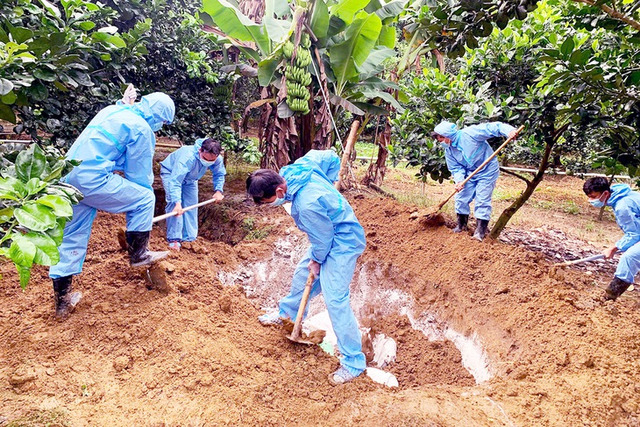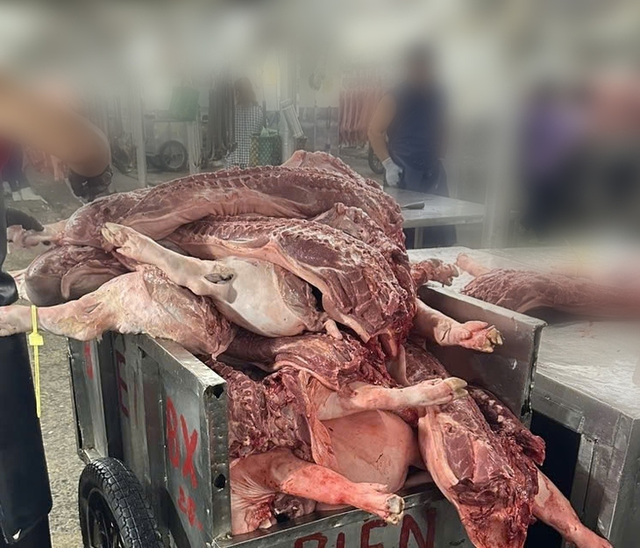
Vietnam ramps up efforts to contain African swine fever outbreak
To control African swine fever (ASF), Vietnam’s Ministry of Agriculture and Environment has urged provinces and cities to strictly follow regulations, promptly eliminate infection clusters, and prevent the outbreak from spreading widely.
Since early this year, 972 outbreaks have been recorded in 718 communes and wards across 33 provinces and cities.
As of early August, there were 542 communes and wards across 30 out of 34 provinces and cities with ASF cases that have not passed three weeks, the incubation period, according to the Ministry of Agriculture and Environment.
Phan Quang Minh, deputy director of the Department of Livestock Production and Animal Health under the Ministry of Agriculture and Environment, identified several challenges.
Compliance with veterinary regulations among some organizations and individuals remains low, with inadequate adherence to biosecurity measures and vaccinations.
Ongoing administrative restructuring has led to inconsistencies in livestock and veterinary management systems between provinces, complicating ASF prevention efforts.
The newly established two-tiered local government system, expansive administrative areas, and underdeveloped veterinary oversight have all contributed to difficulties in disease control.
In some areas, slaughterhouses operate without veterinary inspection because of understaffing, such as in northern Lang Son Province, raising the risk of ASF and other animal diseases.
Surveillance, reporting, and public notification of outbreaks have been delayed or neglected.
Some local authorities and technical divisions remain complacent or uninformed, while farmers sometimes sell sick pigs quickly, facilitating disease spread, Minh noted.
A veterinary expert said that Ho Chi Minh City consumes a very large volume of pork, supplied by many provinces.
Though official inspection stations are installed along major transport routes, unscrupulous traders often avoid them by taking alternate paths, selling sick piglets or diseased pigs to markets or slaughter facilities without oversight.
Trinh Thi Huyen, a trader at a wholesale market, explained that due to stricter inspections at large markets, many traders have distributed pork to informal street vendors and small markets.
In densely populated cities like Ho Chi Minh City, without stronger control, consumers may end up purchasing contaminated pork.
Pham Khanh Phong Lan, director of the Ho Chi Minh City Food Safety Department, stated that local authorities are intensifying inspection of pork entering wholesale markets and supermarkets.
However, the bigger challenges remain informal sellers and unregulated markets, where stalls disperse at high speed upon seeing authorities, making control difficult.
Consumer awareness and refusal to buy illegally processed pork also play a crucial role, Lan added.

Veterinary authorities cull pigs infected with African swine fever in Nam Cat Tien Commune, Dong Nai Province, southern Vietnam. Photo: A.B.
Le Viet Bao, director of the Ho Chi Minh City Animal Husbandry and Veterinary Sub-department, said the city is speeding up testing and sampling schemes.
The veterinary sector is closely inspecting incoming pigs to prevent infected animals.
Inspectors are also stationed at slaughterhouses to oversee operations and issue proper documentation.
Facilities are required to comply strictly with veterinary protocols.
Preventing ASF from spreading
In former Binh Duong Province, which is now part of Ho Chi Minh City, the ASF outbreak is under control.
A few cases detected at small-scale farms were rapidly isolated and resolved, preventing widespread transmission, according to Tran Phu Cuong, director of the Binh Duong livestock, veterinary, and fisheries unit.
However, as Ho Chi Minh City borders major pig farming provinces like Dong Nai and Tay Ninh, it remains at high risk for future outbreaks so control measures must include tracking inter-commune pork transport.
Commune authorities must tighten control of slaughter operations and coordinate with relevant agencies to oversee animal processing and hygiene, especially in densely populated urban and industrial areas.
Unauthorized slaughterhouses lacking hygiene standards and oversight by authorities continue to emerge in some provinces.
Phan Quang Minh emphasized the need for provinces and cities to strictly comply with regulations and eliminate all outbreak clusters.
Authorities must enhance transport controls, detect and penalize illegal trading, slaughtering, transport, and dumping of diseased or dead pigs into the environment, which pose a risk of further transmission and pollution.
Local authorities should assign veterinary staff to each commune to enable early detection and response.
Veterinary practices at both provincial and commune levels must be reformed to address inefficiencies in disease reporting and management.
Strict checks are also needed on vaccine suppliers to eliminate the sale of substandard products.
An expert emphasized that ASF does not infect humans. It affects only pigs.
Nonetheless, consumers should be cautious, ensuring pork is thoroughly cooked and avoiding dishes like raw blood pudding or undercooked meat.
Dong Nai successfully contains ASF outbreak
With nearly 4.2 million pigs, Dong Nai is Vietnam’s largest hog farming province.
From early 2025 to July 28, 15 ASF outbreaks occurred in 12 communes but all have been swiftly contained and monitored.
Around 92 percent of the province’s pig population is farm-based, across roughly 2,000 farms.
The local Department of Agriculture and Environment assessed that the recurrence of ASF originated from previous outbreak sites and emerged primarily from small-scale household farms where farming conditions do not meet biosecurity standards.

Pork is delivered to a wholesale market in Ho Chi Minh City, August 4, 2025. Photo: N.D.
Cuong, the owner of a pig farm with nearly 500 pigs in Dong Nai, remains fairly optimistic despite the ongoing ASF outbreaks in northern and central provinces.
According to him, there are currently very few small-scale pig farms in Dong Nai, making it difficult for the disease to spread and erupt as severely as in the past.
Nguyen Truong Giang, director of the Dong Nai sub-department of livestock production and fisheries, stated that although Dong Nai has a very large pig population, most are raised on large-scale farms, which makes disease prevention more effective.
He also noted that while three types of African swine fever vaccines are currently available on the market, there has been no recorded use or vaccination by farmers or businesses so far.
Regarding disease prevention measures, he said that the immediate solutions include public awareness campaigns, intensified disinfection, stricter management of slaughterhouses, and the culling of sick or infected pigs.
In the long term, farmers should vaccinate their herds, Giang added.
Producers must be supported with compensation programs.
Provincial authorities must mobilize resources for timely detection and resolution of outbreaks, prevent new clusters, and restrict unauthorized transport, processing, and disposal of swines.
Tuoi Tre News
Link nội dung: https://news.tuoitre.vn/vietnam-ramps-up-efforts-to-contain-african-swine-fever-outbreak-103250805182740343.htm